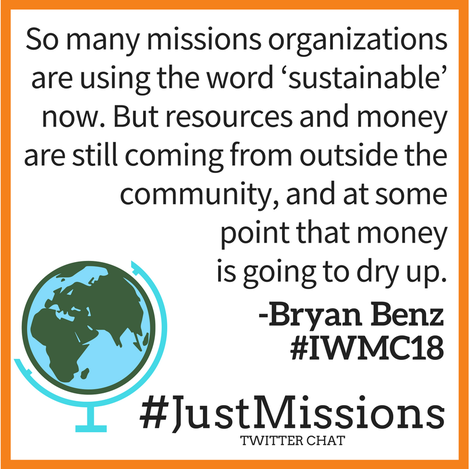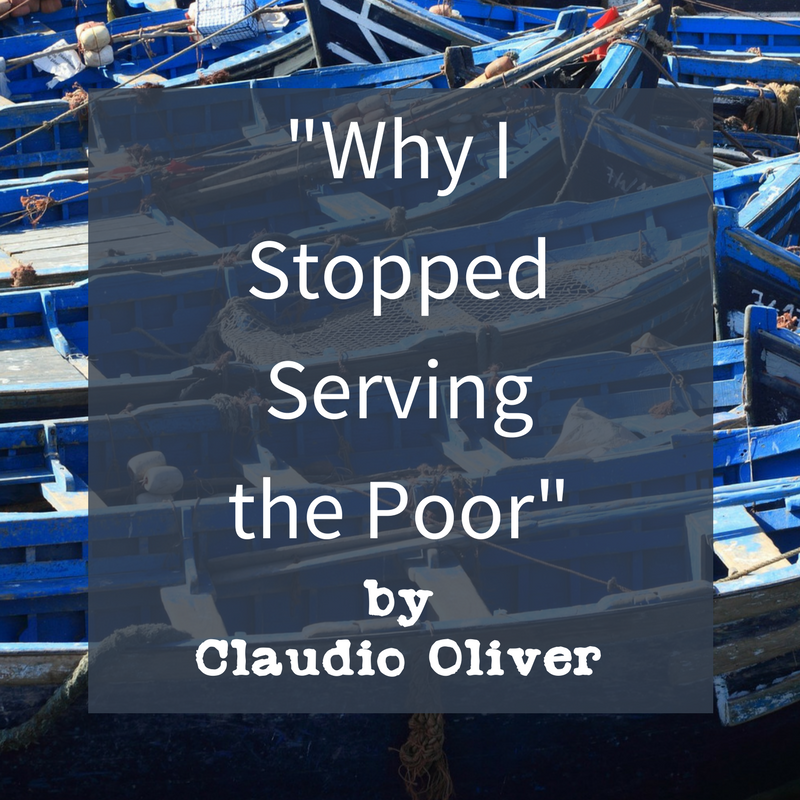 “My passion is really John 17:20-23 where Jesus prays prior to going to the cross, that we become one like the father and son are one,” said Bryan Benz, conference manager for the International Wholistic Missions Conference. “And it’s one of those things where I’ve never talked to a fellow believer who disagreed with that, but it isn’t followed very well. Our tendency is that we go out and get something started rather than looking to see who else God has called in that same area and look to join them.” This is why he believes in the conference. “Relationships formed lead to collaboration, and we can accomplish so much more if we are doing it together.” The conference is in its sixth year and has seen some ups and downs. This is Bryan’s third year as the conference manager. With his background in business, he sees how God has prepared him for the job. “Part of the goal for me individually has been to grow the conference in creating income for the Global CHE network: to develop a sustainable business model for them,” he said. Global CHE (Community Health Evangelism) Network is a nonprofit organization that equips churches and organizations across the globe for Christ-centered community development. Bryan also serves as the Operations Facilitator for Global CHE Network. Bryan said he’s trying to refocus the conference on the core values. “Last year in my desire to grow the conference I got away from the focus on the core values. We had 21 tracks and 181 workshops.” This year, there less of both, and all of the speakers and seminar leaders are asked to review the core values: Integration and Wholism, Local Ownership, Participatory Learning, Reproducible and Transferable Strategies, Servant Leadership, and Sustainable Development. “Wholistic ministry is what we are, but we aren’t saying that other ways are wrong, but this is our focus and we want to bring together these core values. We believe that we can work together and learn from one another on how to do that. How we each interpret and act out those core values are going to be different, and that’s OK,” he said. “I think we can continue to learn from others, and my hope is that we influence each other to be better and more effective in the things we are doing.” “I could have easily had another 20 or 30 workshops, I had to tell that many people no. It’s interesting to me. We don’t pay, and if you aren’t willing to stay for the entire conference, you have to pay,” he said. “That goes back to the philosophy is that the value of you as a speaker is for you to be here for the entire conference is so that people can build networks. It also speaks to the idea that we all have to be learners. That’s such a unique philosophy in doing, especially short-term missions, well is that it’s not all about the go word and not all about all this knowledge we have, but to go as a learner,” he said. “It is paramount. Foundationally that’s where we are going with the conference, that you are coming as a learner not as an expert. The whole willingness to collaborate requires such a willingness to humble yourself and to not think you have all the answers,” he said. “If we are going to work together, I’m not going to be able to do everything exactly how I think it should be. I think that’s a big thing. It’s a challenge for all of us,” he said. “So trying to create those environments to boost opportunities to learn and to work together,” he said. “We’re much more likely to work with others if we have a relationship with them. If we understand their heart than we are much more willing, but that’s a process.” “One of the things we did this year along those lines in the conference is that our very first workshop time is Kingdom Connections: our vision is to have 12 separate rooms and as people register they will be assigned a room and during the 75 minutes there will be a facilitator to network and build relationships. We want to do that in the first workshop time to let people get to know one another. On the second day, we’re dividing people in to 12 areas of the world where they are working or feel led to work,” he said. Local Ownership One of the conference’s core values is Local Ownership. I asked Bryan why this is so important. “People are more engaged take better care of things that they own,” he said. “Whether we want to think about renting a house or a car to owning those things. It’s just a different level of how we are engaged in taking care of them. Additionally, I think so much of the world—the developing world in particular—is so fatalistic, there’s a lack of control: of belief that they have any impact. If you go to the places in Liberia: 1 in 5 children were dying prior to age 5. So, for moms with five kids, they feel out of control as to whether or not one of the children will die. But if there is hope that there is something the mother can do and she owns that, then it changes the mindset.” He said that it is important for locals to believe in themselves, “that they don’t have to wait for people outside their community to help solve their problems. That local initiative changes the mindset, it creates an attitude of volunteerism, and all those things lead to sustainability.” “Our tendency as Americans is: ‘I’m going to give you your house, but I’m not going to let you paint it a color I don’t like.’ When the funding is coming from outside there is usually strings tied to it. It’s part of us as people thinking we know best,” Bryan said. “There are those times when realistically you might know what’s best but if you give people ownership, you have to let them determine what’s best themselves.” Sustainability Another core value of the conference is Sustainability. “Sustainability is one of the new buzz words,” Bryan said. “So many of the missions organizations are using the word ‘sustainable’ now. What I see is that as you have discussions, very few of them are using sustainable in a way I would. Resources and money are still coming from outside the community, and at some point that money is going to dry up. Sustainable to me is that the human resources, time resources, and monetary resources are coming from within the community and controlled by the community,” he said. “There is time where things from outside need to be brought in, but going back to the ownership principle, there should be very little outside resources and they cannot come in frequently. The down side of that is that it’s slow: but that’s where you have to start. I was in Uganda evaluating a nonprofit … and all the locals were looking to be adopted by churches in the U.S. They were giving us a list of all of their needs. In each place I said, ‘Well what do you have? What are your resources?’ Trying to change the mindset to the idea that there already exists resources within one’s community. Whether labor or other resources.” “Development takes times,” Bryan said. “It’s much easier to give a man a fish than to teach him how to manage the lake. It’s a much longer process and it’s harder to see results. From what we’ve seen from a funding standpoint, as churches in ministries move into this idea of development it’s harder to show donors results. It’s much easier for me to point out how many bottles of water I gave out or how many backpacks I gave out. But true development: how do you show the progress? It’s a different thing. On STM’s it’s much easier to show I built this house or I painted this house, than to say I built relationships and I empowered others. Those are some of the challenges,” he said. Hindrances for the American Church “In my limited six years of serving at Global CHE, the American Church is much aware that things need to change and that things aren’t working the way they’ve been done. I think it’s a big ship that needs to be turned. My sense is that there is much more of an awareness that it needs to be turned, but there’s a lack of awareness on how. I run into more church leaders that are saying, ‘Yes, it’s not working; but what do we do and how do we do it?’ Earlier it was much more of a why, now it’s much more of a how, so I’m encouraged by that. The focus is in our churches is so much on the goer and what it does for that person as opposed to the receiver. I think it requires training and more effort to change the mindset that the focus should not be all about the goer,” he said. “More people are asking the question, ‘What are we doing when we go?’ It’s still a challenge. The other part of it is, ‘What are we doing when we come home?’” Bryan asked. He said that most people think their short-term trip “has made a lasting impact on their lives but it hasn’t made an impact here in the U.S. I don’t know any church that’s doing a really good job with short-term missions participants coming home. They do a debriefing, but I don’t see them being plugged into discipleship … I’d like to get something started.” “The biggest hindrance for the American Church is time,” he said, “why it’s not being done. The time that it takes to do that. There’s all this prep and training,” he said. Bryan said he’s struggled to make a pathway to facilitate some of these conversations and trainings with church youth. “I’ve offered to go and facilitate, I thought it’d be easier to start with the high school kids. I think these principles would resonate with younger people phenomenally, and I think it’s such a part of what the younger people need. It would impact the number of young people leaving the church because it’s not relevant to them. We’ve created such a performance-minded culture with our youth, totally lacking local ownership, so they become customers of the church not owners of the church,” Bryan said. “I think we need to take baby steps.” Additionally, he said that most ministries are not wholistic. “It’s a whole other challenge. To consider the person’s physical needs and typically most missionaries are all about their spiritual needs. I think we need to start where people are, as opposed to having a predetermined method of how we share the gospel,” he said. Bryan’s Story Bryan has been with Global CHE for six years. He spent 25 years owning and operating gas stations in Tucson. “My businesses failed, and in that process I was searching and questioning if God was in control, asking ‘Why God is this happening?’ Basically through 2011, I ended up making arrangements to sell my business and my last day was Jan 28, 2012. On January 30, I was in Phoenix in what we call a TOT, a training of trainings for CHE. The person leading it is now my boss. Everyone involved in CHE was self-supported missionaries,” he said. “The idea of raising support was overwhelming to me. But the first week of February and next few months God convinced me this is what he wanted me to do. It took a couple of weeks for me to get my courage up to say something to my wife,” he said. Bryan’s wife is a school psychologist working in the public schools. “She supported my decision,” he said. “We are living in the same house we’ve lived in for 16 years … I still struggle with the idea that I’m a missionary—I put quotations around it. We use that word called; it’s part of our separation between the sacred and secular. When I was in the gas station business, I was just as much in ministry as I am now. It’s been a journey, and a struggle because it was a big change. You are going in one direction, I was where I could support missionaries and lead my local church and teaching Sunday School … I thought I was in the right place, but God brought me to a different place,” he said.
0 Comments
Leave a Reply. |
Gena's
|

 RSS Feed
RSS Feed

